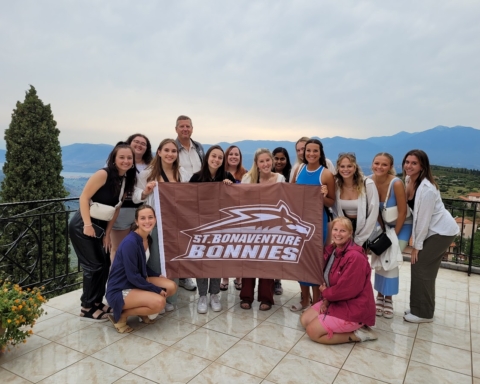Photo courtesy of Positano News Staff
Positano News interns take notes in front of a structure from an ancient Roman villa.
BY ELIZABETH EGAN, FEATURES ASSIGNMENT EDITOR
For anyone planning to make studying abroad part of your college experience, don’t.
Instead, seek an internship. For me, interning at Positano News in Piano, Italy, turned out to be the most valuable experience of my education thus far.
In an English-speaking study-abroad program, students spend much of their day in a classroom with other English speakers.
They will have the opportunity to explore their temporary home country and the surrounding areas. However, their experiences might be nothing more than that of a tourist.
Do not waste the opportunity to learn in a foreign country by spending your time in a classroom.
Start at your university’s study abroad office. If it does not have suggestions or opportunities that will be right for you, do some research.
Interviewing the mayor of Positano, Italy, or studying particle physics in Geneva, Switzerland, include just a couple of the infinite possibilities you could discover for yourself.
The Sant’Anna Institute in Sorrento, Italy, offers a summer internship program. Internships range from nongovernmental organizations helping Ukrainian refugees to event planning in some of the most luxurious resorts on the Amalfi Coast.
CERN, The European Organization For Nuclear Research, hosts international interns. Those interested in science would have the opportunity to work in the largest particle physics laboratory in the world. Their internships range from accounting to marketing.
Any student can apply to these two programs. More importantly, the programs provide housing and do not require the interns to know Italian or French.
Another option, simply apply to internships in other countries as you would in the United States. If you speak a language other than English, great. If not, apply in English-speaking countries or reach out to companies to see if they accept English-speaking interns.
What can you actually gain from an internship abroad?
Based on my experience you will learn how your industry operates in a different country. Working in a newsroom meant learning how to publish work without the protections of the first amendment.
Working in an office where people spoke little English meant developing skills in listening for tone and observing body language. These skills became important when words could not be understood. When this failed, advanced-problem solving skills needed to be had to effectively work with people I could not understand.
You would learn different workplace cultures. In Italy, putting a water bottle on the table or declining an espresso could be considered incredibly rude]. Being aware of such customs, even back in the United States, would help you in whatever career you pursue.
If you plan on going abroad in college, don’t just visit a country. Become a part of it.
eganea20@bonavneture.edu









